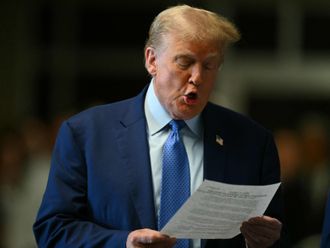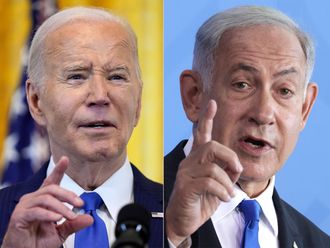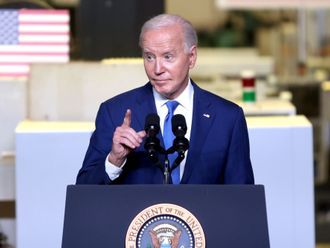Beirut: Carla del Ponte, a former Swiss attorney-general and prosecutor with the International Criminal Tribunal for the former Yugoslavia, and currently the head of the United Nations Independent International Commission of Inquiry on Syria, told Swiss TV there were “strong, concrete suspicions but not yet incontrovertible proof” that chemical weapons were used in Syria.
Del Ponte revealed that her panel had not yet seen evidence of government forces using such armaments, but added, without providing any evidence, that “this was use on the part of the opposition, the rebels, not by the government authorities.”
“Our investigators,” Del Ponte continued, “have been in neighbouring countries interviewing victims, doctors and field hospitals and, according to their report of last week, which I have seen, there are strong, concrete suspicions but not yet incontrovertible proof of the use of sarin gas, from the way the victims were treated,” again without enlightening her audience with any additional details.
How opposition forces acquired sarin, for example, remained a mystery. She did not reveal what types of injuries were noticed, presumably saving the information for her next report, though she did not say so. How many victims were counted and under what levels of severity were kept secret too, as Del Ponte refused to shed light on any of these concerns.
Of course, her declarations — that revolutionary forces used sarin gas — damaged the opposition’s image in the international community, which has been wary of any military involvement in Syria. Beyond assertions that extremists dominated opposition ranks, this latest salvo highlighted an alleged devotion to dangerous systems, something that major Western powers dreaded. For its part, Damascus leaked carefully placed news stories, affirming that its disciplined army was defending the nation from terrorists who, case in point, seldom shied away from using banned weapons.
Notwithstanding such an interpretation, the Syrian government remained under growing American and European pressure over the alleged use of such weapons itself, something that Del Ponte’s interview partially exonerated. Under the circumstances, if Del Ponte was correct in her evaluation — that it was not Damascus that used such banned weapons — the so-called “game changer” argument presented by US President Barack Obama, or by his European counterparts, lost much of its meaning.
For well over a year, Washington and London in particular maintained that there was “evidence of Syrian government forces having used Sarin, with the US declaring that it had “varying degrees of confidence” that chemical weapons were deployed on battlefields without, once again, providing any corroborating evidence. A few weeks ago, President Obama called for a “vigorous investigation,” presumably by the UN Independent International Commission of Inquiry on Syria, to determine whether such weapons were used. In the affirmative, Obama contended, such uses would be a “game changer” without, however, clarifying how and on for whom.
In the event, both the Syrian government and the Syrian National Coalition accused each other of using chemical weapons in the past, with President Bashar Al Assad swearing that Damascus never resorted to such armaments, denouncing Western accusations as “lies.”
The latest Del Ponte interview will thus strengthen the Syrian president’s contentions, although it was critical to note that the latest Israeli air attacks on a Syrian military “research centre,” might have been carried out because Israel suspected potential chemical warfare activities. Damascus insisted that the research centre worked on rocket propulsion systems and accused Israel of co-ordinating its operation with revolutionary forces. Israelis were mum but whether their latest air attacks on the Damascus facility where related to a separate bombardment of a shipment of missiles presumably destined for the Hezbollah movement in Lebanon last Friday were difficult to determine.
Routine Arab condemnations and customary mild Western admonitions aside, Del Ponte’s interview cast doubt on the Commission’s dedication to truth, as she emphasised the need for further evidence from witnesses to verify what was known so far. Since August 2011, when her commission was established to examine alleged violations of human rights in the Syrian conflict after the start of the March 2011 uprising, Del Ponte issued what unfettered observers concluded were inconclusive reports as the numbers of the dead, wounded and suffering increased.
It was with that in mind that a separate UN team was established to look specifically into the issue of chemical weapons since her ‘Independent International Commission of Inquiry on Syria’ merely played for time.












